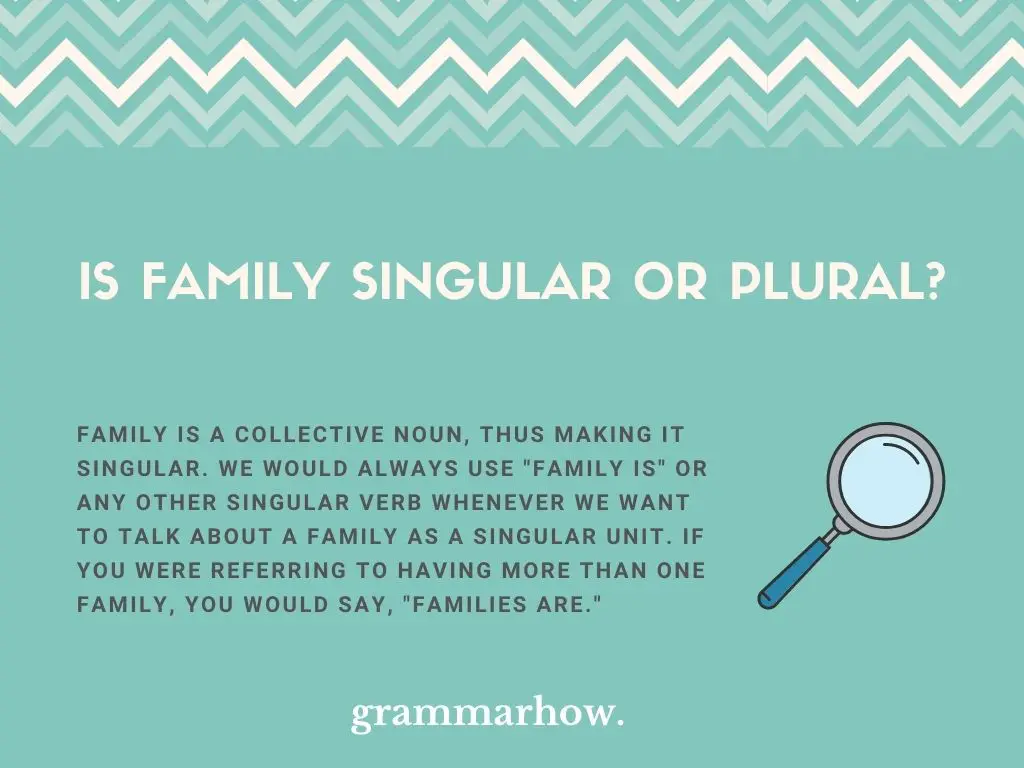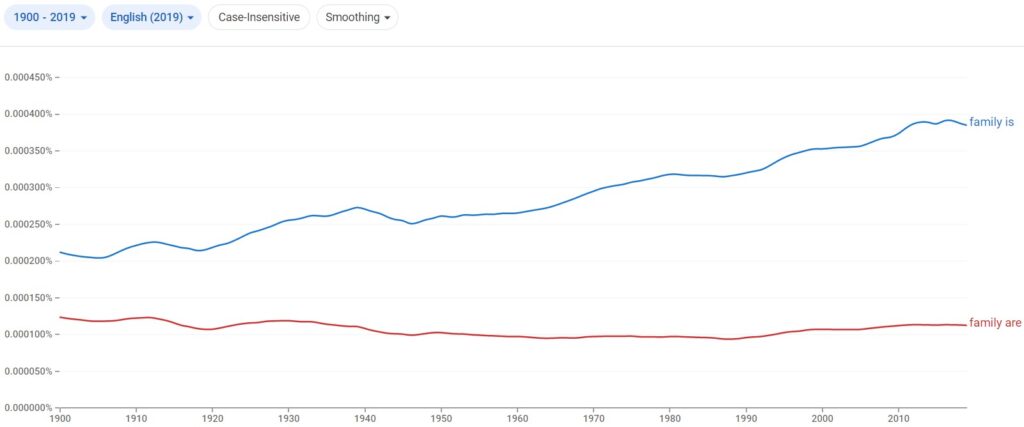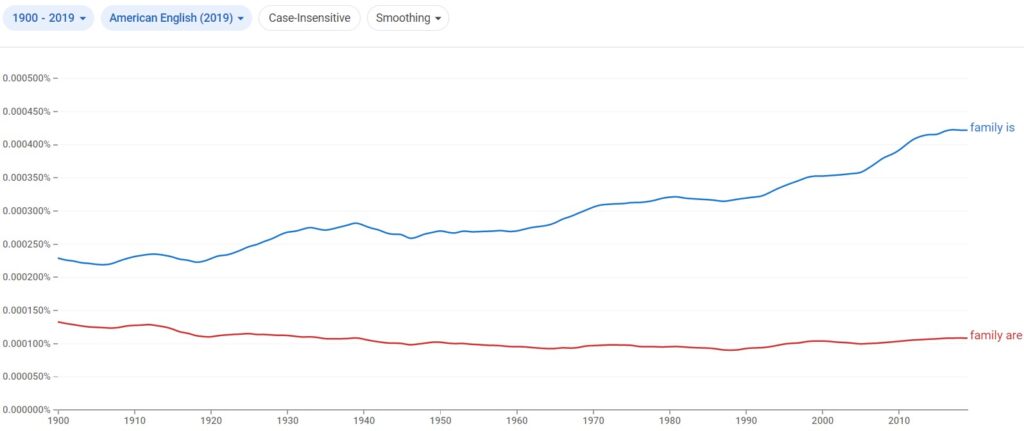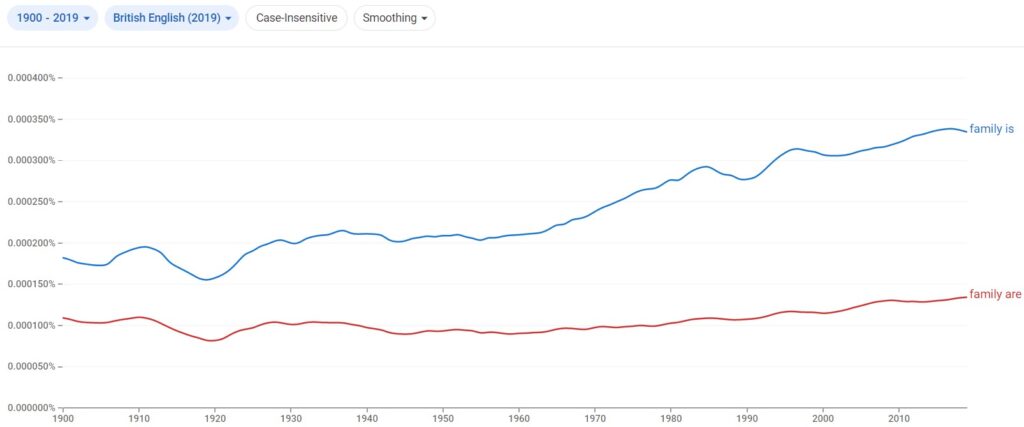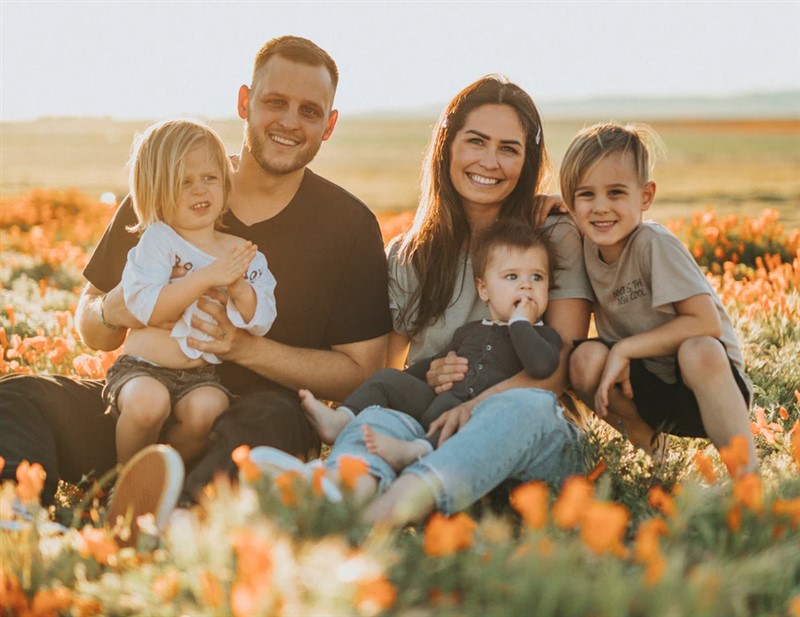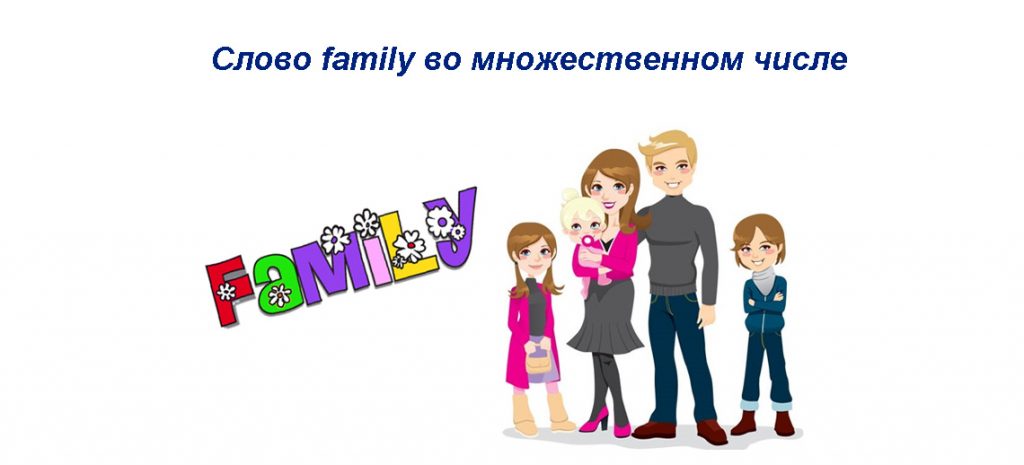There are some interesting rules associated with the singular and plural forms of “family.” You need to make sure you know what those rules are before writing about them, and this article will help you understand all there is to know.
Family is a collective noun, thus making it singular. We would always use “family is” or any other singular verb whenever we want to talk about a family as a singular unit. If you were referring to having more than one family, you would say, “families are.”
You would only use “family are” if you’re talking about each individual member of your family. If you are not grouping them up, and you refer to them as singular people, then “are” might make more sense as a plural verb.
When Should I Use “Family Is”?
“Family is” works in almost all cases. We use it in this way because “family” is a collective noun. We treat it as a singular unit, which implies that a singular verb is always the correct form to use.
- The family is gathering already. Would you like me to tell them to wait?
- I think the family is having a hard time coming to terms with this. You need to help them out.
- Your family is a nightmare! I’m glad I’m not marrying into it.
- My family is the best thing that ever happened to me. I wouldn’t change them for the world.
- This family is important to me. We might not be blood relatives, but we’re close enough.
- His family is trying to turn me away from him. I don’t like them at all.
- Your family is making this easy for me. I’ve already made my decision.
When Should I Use “Family Are”?
While it’s less common, “family are” is still correct. It would help to know when it works.
We use “family are” when we are singling out each member of the family in some way. It’s common for us to see phrases like “the people in the family are” beforehand. This helps us to single out specific people to use them in the plural form.
- All the people in my family are doctors.
- The guys in the family are having a party about this right now.
- You and your family are making this very difficult for me. Please help me instead of being a nuisance.
- He and my family are making the cakes. Are there any specific flavors you’d like?
- The people within the family are bickering amongst themselves. I wish they would be quiet for two seconds.
- The groups in his family are already forming. They need to settle these debates quickly.
- All the guys in the family are unsure whether they want to go ahead with this.
Is “Family Is” Or “Family Are” Used The Most?
It might help to know which of the two forms is more popular. While they are both correct in some cases, there is a clear winner in popularity between them.
According to Google Ngram Viewer, “family is” is used the most. This shows that “family” is more commonly treated as a single unit. We use it as a collective noun to refer to multiple family members, so it makes sense to see it in this way.
With that said, “family are” is still correct. You can tell that because the graph shows that it does get used. It simply isn’t used as much as “family is.”
Is It “My Family Is” Or “My Family Are”?
“My family is” is correct in almost all cases. We use it when we want to refer to our family as a group of people only. “My family are” only works when we’ve already singled out each member with something like “all the people in my family are.”
- My family is coming to town any minute now. Please be on your best behavior.
- The people in my family are hard to get along with.
Is It “You And Your Family Is” Or “You And Your Family Are”?
“You and your family are” is the only correct form. We are referring to “you” (one person) and “your family” (one unit). Therefore, there are two total units being spoken about, meaning that a plural form is always suitable whenever we use “you and your family.”
- Correct: You and your family are making this quite hard for me.
- Incorrect: You and your family is being ridiculous. Can’t you change your minds?
Is It “The Smith Family Is” Or “The Smith Family Are”?
“The Smith family is” is correct in most cases. We use it when we are talking about the “Smith family” as a unit of people. We might use “the Smith family are” if we single out all the members (similar to using “my family are”).
- The Smith family is making this hard. We need to come to some kind of arrangement with them.
- The people in the Smith family are having a hard time understanding this.
Is “Family” Singular Or Plural In American English?
According to Google Ngram Viewer, “family” is singular in American English. We can see this is the case because “family is” is the most popular choice when looking at the two forms.
Is “Family” Singular Or Plural In British English?
Likewise in British English, Google Ngram Viewer shows that “family” is still correct as a singular form. In both countries, “family are” is sometimes used, but it’s the least popular choice, meaning “family” is better used as a singular word.
Is “Family” A Collective Noun?
“Family” is a collective noun. That’s what allows us to use the singular verb form after it. We are “collecting” each member of the family into one singular unit, which is why the verb form is correct.
Is “Family” A Proper Noun?
“Family” is not a proper noun. Proper nouns require capital letters no matter where they appear in writing. Things like names and places are usually proper nouns to show their significance. “Family” should always be uncapitalized as a regular noun.
You may also like:
“Family Was” or “Family Were” – Correct Version (With Examples)
“Family Has” or “Family Have” – Correct Version (With Examples)
Martin holds a Master’s degree in Finance and International Business. He has six years of experience in professional communication with clients, executives, and colleagues. Furthermore, he has teaching experience from Aarhus University. Martin has been featured as an expert in communication and teaching on Forbes and Shopify. Read more about Martin here.
Is Families Plural or Singular?
To better understand a word and how it should be used, it is important to define it. According to the Merriam Webster Dictionary, the word family is defined as “the basic unit in society consisting of two parents rearing their children.” It is also defined as “a group of persons of common ancestry.” The word family has taken on many meanings over the years, especially in modern times, when an everyday family looks a little less traditional. People often refer to their closest friends as their family members because of the familiarity and closeness they feel to them.
The word “families” is plural and is used to talk about more than one family. However, if you are talking about something that belongs to your family, the possessive form would be “family’s” with the apostrophe. The plural possessive would then be “families’.” This remains the same in both American English and British English.
How Do you Pluralize a Family Last Name?
Just as there are rules for plurals for regular nouns, there are also rules for proper nouns. Last name plurals are often used when referring to the family unit as a whole. For example, “the Kennedys” is referring to the entire Kennedy family. To refer to the Smith family, you would call them the Smiths. Something to keep in mind when you’re writing out greeting cards!
For most family names, you would add an “-s” to make them plural. But when the last name ends with “ch”, “sh,” or “z” (basically, anything that makes a “z” sound), you would add an “-es” to make them plural. A good example of this is “Keeping up with the Joneses,” from the family name “Jones.”
For example, the Marsh family would be the “Marshes.”
Of course, there are other exceptions to these rules, like if your name ends in “-ch” but is pronounced with the hard “k” sound, then you would only add an “s.”
Simply add “the” to the plural of the family name, and you’re all set.
The History and Origin of the Word
One of the best ways to understand a word is to learn where it came from. A word’s etymology can reveal a lot about the changes a word has gone through to get to where it is today in modern English. According to EtymOnline.com, family comes from the early 15th century from the meaning “servants of a household.” It is from the Latin word “familia,” meaning “family servants, domestics collectively.”
There are many derivatives of the word family, such as “famula,” meaning a “serving woman” or “famulanter,” which meant “in the manner of a servant.”
In the 1700s, the term “family tree” was around in reference to a graph of ancestral relations. In the 1960s, the phrase “family values” became popularized when referring to how appropriate something was for children.
This is a good example of how words evolve and change over time because of culture and its influence. Words can quickly take on new meaning, so it is important to keep up to date on a word, so you don’t offend anyone or sound unintelligent.
There are also many different kinds of families that exist today. The structure of a family has changed drastically over the last 50 years.
- A nuclear family is the most traditional type of family that consists of two parents and children. This used to be known as the “ideal” situation to raise children in.
- Another type of family is a single-parent family. This consists of one parent who is raising children on their own. This could be a single mother or single father. One in four children today are born to a single mother.
- An extended family consists of two or more adults who are related by blood or by marriage, living together. This could be multiple generations of parents and grandparents or an uncle or cousin.
- Another common family structure is a step-family. This is where a mother remarries, or a father remarries, and they live with their new spouse. This creates a “blended family,” which consists of multiple parents and can sometimes become difficult to navigate.
There is no “correct” family structure because everyone is different. It depends on your family and how you get along with one another.
Examples of the Word in Context
Another good way to learn a word and apply it to your own vocabulary is to hear it used properly. Reading it or hearing a word used in its correct context is a great way to learn how to
use it yourself. Here are some common examples of the word family used in conversation:
- “John’s family offered to let his friend stay with them.”
- “What is our family doing for dinner tonight?”
- “Our families get along really well together.”
- “I think you should talk to your family first before making the decision.”
Synonyms for Family
Finally, exploring words with similar or related meanings can be a great way to solidify a word into your own vocabulary. Here are some common synonyms for the word family:
- A clan is usually a group of people tracing descent from a common ancestor.
- Kin is a group of persons of common ancestry or one’s relatives.
- Lineage is a descent in a line from a common progenitor.
In Summary
It is important to understand that the English language takes a lifetime to master. Many things about the language don’t make sense and require quite a bit of memorization.
But now you are hopefully fully prepared to use the word family in any context, written or spoken. Good luck!
Sources:
1.https://www.merriam-webster.com/dictionary/family
2.https://www.etymonline.com/search?q=family
3.https://www.dictionary.com/e/plural-last-name/
4.https://thewordcounter.com/blog-comma-before-so/
5.https://thewordcounter.com/blog-word-to-use-very/
6.https://thewordcounter.com/what-is-a-proper-noun/
Kevin Miller is a growth marketer with an extensive background in Search Engine Optimization, paid acquisition and email marketing. He is also an online editor and writer based out of Los Angeles, CA. He studied at Georgetown University, worked at Google and became infatuated with English Grammar and for years has been diving into the language, demystifying the do’s and don’ts for all who share the same passion! He can be found online here.
Приветствуем всех ценителей английского языка! Как известно, English language славится своей простотой, но это свойство не мешает ему прятать в своей грамматике множество подводных камней. Вот, например, вопрос о том, как написать во множественном числе family, на первый взгляд простой. Но когда начинаешь обращать внимание на детали, то понимаешь, что слово семья по-английски во множественном числе пишется крайне своеобразно. Именно поэтому столь специфичному вопросу мы и решили уделить внимание с помощью отдельной статьи. Итак, сегодня будем разбираться, как образовать множественное число для family и для чего вообще это нужно делать. Приступим к работе!
Начать хочется с не менее интересного вопроса о том, в каком вообще числе используется family на английском: во множественном или единственном. И это действительно важный нюанс, поскольку от числа подлежащего зависит форма глагола (например, are или is, say или says и т.д.).
Вся загвоздка заключается в том, что family – собирательное существительное. Иначе говоря, одним словом мы обозначаем целую группу людей. Здесь и возникает проблема: считать это слово выражением множества или же во всем следует сохранять признаки единственного числа существительного, которым собственно и является данный термин. И если вы ждете от нас однозначного ответа, то напрасно, ведь можно сказать семья по-английски и во множественном числе, и в единственном. Почему? Дело в том, что в данном случае грамматика зависит от контекста ситуации.
Так, когда мы говорим о семье, как о единой, неделимой группе людей, то уместно будет согласовывать глагол в единственном числе. Поскольку само по себе понятие family и подразумевает объединение нескольких человек в одну ячейку общества.
- Jess, our family is everything to me. — Джесс, наша семья – это всё для меня.
- My family is discussing a possible move to Great Britain. — Моя семья обсуждает возможный переезд в Великобританию.
- His family is scattered all over the world. — Его семья разбросана по всему свету.
А вот множественное число слова family проявляется в ситуации, когда намерено хотят подчеркнуть индивидуальность каждого члена семьи. Иначе говоря, контекст подразумевает не единую семью, а именно совокупность членов семьи, так сказать, собрание личностей и индивидуумов.
- The whole family are musicians. — Вся семья – музыканты (каждый член семьи – музыкант)
- All his family are flourishing. — Вся его семья процветает
Как видно, различие в контекстах довольно тонкое, но все же оно есть, и потому такой грамматический нюанс следует иметь в виду. Хотя откровенно говоря, чаще со словом family все же используют сказуемое в единственном числе. Но опять же, предупрежден – значит вооружен, тем более что в разговоре любая мелочь способна повредить правильному взаимопониманию собеседников.
Это все, что касалось употребления family в английском языке со множественным или единственным числом глагола. Сейчас же поговорим о множественной форме самого существительного, что тоже крайне важно.
Пишем форму множественного числа для family
Как мы уже выяснили, слово family собирательное, но все же обозначающее одну семью. Если же речь в разговоре идет о нескольких семьях, то следует заменить единственное число family на множественное, чему и будем учиться прямо сейчас. А понадобится нам для этого лишь вникнуть в нюансы образования множественного числа английских существительных.
В плане грамматики существительных английский язык не отличается обилием правил: все преобразования достаточно просты и лаконичны. Так, множественное число существительных в большинстве случаев образуется путем присоединения к слову дополнительной буквы –s. При этом особое внимание следует уделить окончанию основы слова, поскольку в зависимости от ситуации оно может измениться. Как раз и станет наглядным примером этого правила в английском языке множественное число family.
Согласно грамматической норме, для образования множественной формы необходимо присоединить к слову –s. В таком случае мы получили бы термин – familys. Однако, подобное написание неверно. Поэтому особое внимание стоит уделить правилам добавления этого окончания –s. В частности, есть уточнение, что при добавлении –s к конечной гласной y, эта самая гласная изменяется на буквосочетание ie. И только после проведения данной трансформации, к термину уже присоединяется конечное –s. В результате соблюдения всех необходимых правил, обозначение семьи по-английски во множественном числе выглядит следующим образом:
- families
Именно так, и никак иначе, можно рассказать на английском языке сразу о нескольких семьях. И чтобы эту форму слова вы запомнили легко, но надолго, закрепим ее изучение с помощью наглядных примеров употребления families в английской речи. Кстати, заодно обратите внимание на то, что английский термин, в отличие от русского, никогда не изменяется по падежам.
- These families live in the poorest area of the city. — Эти семьи живут в самом нищем районе города.
- Our students come from the finest families. — Наши студенты происходят из благороднейших семей.
- The man has just caused a lot of problems for these people’s families. — Этот человек доставил множество проблем семьям этих людей.
А следующая знаменитая поговорка поможет ученикам убить сразу двух зайцев: и запомнить подходящую family форму глагола, и научиться превращать данное во множественный термин.
- All happy families are like one another; each unhappy family is unhappy in its own way. — Все счастливые семьи похожи друг на друга; каждая несчастливая семья несчастна по-своему.
Вот и подошло к завершению наше сегодняшнее занятие. Надеемся, что теория была легка и доступна, а практические примеры действительно помогли вам быстрее разобраться в сути правил и запомнить верное употребление слова family во множественном и единственном числе. Успешной практики полученных знаний и до новых встреч!
Просмотры: 3 841
Last Update: Jan 03, 2023
This is a question our experts keep getting from time to time. Now, we have got the complete detailed explanation and answer for everyone, who is interested!
Asked by: Deja D’Amore Sr.
Score: 4.1/5
(30 votes)
The noun family can be countable or uncountable. In more general, commonly used, contexts, the plural form will also be family. However, in more specific contexts, the plural form can also be families e.g. in reference to various types of families or a collection of families.
Do you say families or family’s?
When we refer to a house that belongs to a family, we say «family’s house». Pluralizing family gives us «families». Referring to the houses of several families, we say «families’ houses». Forming the plural possessive in such a case is rather simple.
Can you say families?
Family and Families are two words that are often confused as one and the same word without any sort of difference. Strictly speaking there is some kind of difference between the two words. Family is the singular form whereas ‘families’ is the plural form.
How do you make family plural possessive?
For showing family possession with surnames that are plural and possessive, make the name plural first by adding an “s” and then add an apostrophe to make them possessive. The Smiths’ car was parked illegally. (The car belonged to Mr. and Mrs.
How do you use the word families?
Families sentence example. When there were two mothers, the two families shared equally in the father’s estate until later times when the first family took twothirds. Betsy located the families Howie saw in our last session.
25 related questions found
Is it correct to say friends and families?
«Family» can occur in the plural, but that would be when you are referring to more than one group of people where each group consists of members related to each other.
Is it Jones family or Jones family?
Part of keeping up with the Joneses means spelling your family name right. … The Joneses is correct because it indicates more than one member of the family. The Joneses’ indicates possession, as in the Joneses’ home.
Is family it or their?
«Family» is a singular noun. Therefore, at least in AE, it takes «its.» However, BE often treats collective nouns (singular in form, but consisting of more than one item) as plural.
Is family’s correct grammar?
The word families is plural, denoting more than one family. The word family’s — with an apostrophe and added “s” — is singular and shows possession.
Is parents plural or singular?
Parents, as a noun, is the plural form of parent. A mother is one parent. A father is one parent. A mother and father are parents.
Is Familia singular or plural?
There are no exceptions of the kind that English shows in, for example, the use of some collective nouns like «family» or «government» or proper names of institutions. So if the subject of your sentence is mi familia then the verb must always be in the singular.
Is it Smiths or Smith’s?
The plural of Smith is Smiths. NOT Smith’s. And if for some reason the Smiths wanted to use the possessive, they would have to use the plural possessive.
How is Jones plural?
The plural of Jones is Joneses, ‐es being added as an indicator of the plurality of a word of which the singular form ends in s, as in dresses or messes. The apposition of the much misused apostrophe to the word Jones does not pluralize it.
Is it Jones or Jones possessive?
According to English style guides, singular possessives are formed with –’s and plurals with just an apostrophe, so the possessive of the singular Jones is Jones’s and of the plural Joneses is Joneses’.
How do you use family in a sentence?
They were my family’s angels and they watched over my kids so they didn’t have to be taken into care. He had his family’s blessing, but says he would have made the break either way. Mostly they were stoic as the tiniest details of the family’s nightmare were revealed.
What are friends and family called?
As a phrase, there is kith and kin: friends and relatives; people known to someone.
What makes your family different from other families?
Families are different from each other by the number of persons who live. … A nuclear family has only a couple, with or without kids. A Joined family has grandparents, parents, in-laws, sons, daughters, and kids.
What is the plural of Ross?
The possessive form of almost all proper names is formed by adding apostrophe and s to a singular or apostrophe alone to a plural. By this style rule, you would express the plural of Ross as Ross’s.
Is it 1970s or 1970’s?
The apostrophe in ’70s is forming a contraction for the numbers you are replacing in the spelled out version “1970s.” Never put the apostrophe before the “s” when describing decades. For plurals of multiple letters, we can again scrap the apostrophe and just add “s.” Example: “He is learning his ABCs right now.”
How do you write the plural of Davis?
If the name ends in s, z, ch, or sh, add es. That means the Davis family becomes the Davises, the French family becomes the Frenches, the Hernandez family becomes the Hernandezes, the Glaves family becomes the Glaveses. If the name ends in x, add es—unless the x is silent.
Is it the Smith family or Smiths family?
The Smiths is plural for «Smith» and means there is more than one person named Smith and the invitation is from them all. When in doubt, we like to use «The Smith Family». The Smith’s (with an apostrophe before the s) is the possessive of «Smith» and indicates one person ownership.
Which is correct Smith residence or Smith’s residence?
Unlike singular possessives, which take an apostrophe followed by an S, plural possessives take an apostrophe alone. So if you’re going to the home of the Smiths, you’re going to the Smiths’ house.
Is it love the Smiths or love the Smiths?
A common mistake is to make the family name plural by adding an «s» — with an apostrophe before it. So if your name is Smith, and you’re signing your cards on behalf of the whole family, you’d sign it «Love, The Smiths,» not «Love, The Smith’s.» Names that end in «s» — like Jones — also tend to trip people up.
Does Familia mean family?
Meaning “the family” in Spanish, la familia variously refers in English to one’s family, circle of friends and coworkers, teammates, or other close communities or organizations.
What is Mi Familia conjugation?
1. vote. Well, «mi familia», the subject of the sentence, is a singular noun, so you go to the third person singular and conjugate nadar in that tense, giving you nada. If you’re wondering why it’s present tense, it’s because it’s an ongoing action and isn’t occurring in either the past or the future.
Table of Contents
- Is family a plural word?
- Which is correct family is or family are?
- Why is family singular?
- Does family take a singular or plural verb?
- Is family is a collective noun?
- Which pronoun is used for family?
- Can we use they for family?
- How do you describe your family?
- How do you refer to a family?
- What is family in simple words?
- Is family a word?
- What is word family in English?
- What is word family in English grammar?
- What is a word family happy?
- Whats is happy?
- What is a word family in kindergarten?
- What is the root word for family?
- Does Familia mean family?
- What is a antonym for family?
- What are the 7 types of families?
- What is a normal family like?
- What is the ideal family in the society?
- Who is considered extended family?
- What are the qualities of a happy family?
- What makes a successful family?
- What makes a family unique?
- What is strong family?
The noun family can be countable or uncountable. In more general, commonly used, contexts, the plural form will also be family. However, in more specific contexts, the plural form can also be families e.g. in reference to various types of families or a collection of families.
Which is correct family is or family are?
Family is a collective noun, which is considered as a single group. So, it should be followed by a singular noun. The plural form of family is families. In this case, it will be- my families are.
Why is family singular?
The reason is that while family refers to a group of people, it refers to the group of people as a single unit, or collection. Nouns like this are called collective nouns, and in American English, collective nouns take singular verbs. (group is a collective noun, was asked is a singular verb)
Does family take a singular or plural verb?
Collective nouns, like team, family, class, group, and host, take a singular verb when the entity acts together and a plural verb when the individuals composing the entity act individually.
Is family is a collective noun?
Family, for example is a collective noun. It stands for one unit or group but consists of more than one person. Here are some more examples of collective nouns: family, team, jury, committee, organization, class, herd, army, council, group, audience, panel, board, flock, staff, choir, orchestra.
Which pronoun is used for family?
they
Can we use they for family?
‘Family’ is a singular, collective noun. However, when talking about a family, the correct pronoun is ‘they’. If you use the word family, the word follows the rules of ‘it’.
How do you describe your family?
Words to Describe Family Relationships
- adoring.
- affectionate.
- boisterous.
- brotherly.
- close-knit.
- cohesive.
- competitive.
- devoted.
How do you refer to a family?
Alternatively, write the parents’ names followed by “and Family”. In situations where you don’t know the names of any or all children in the family, it’s acceptable to refer to children collectively. In this case, on the second line where you would normally name the children, write “and Family”.
What is family in simple words?
noun, plural fam·i·lies. a basic social unit consisting of parents and their children, considered as a group, whether dwelling together or not: the traditional family. a social unit consisting of one or more adults together with the children they care for: a single-parent family.
Is family a word?
Word families are groups of words that have a common feature or pattern – they have some of the same combinations of letters in them and a similar sound. For example, at, cat, hat, and fat are a family of words with the “at” sound and letter combination in common. You can study one word family a week.
What is word family in English?
Word families are groups of words that have a common pattern or groups of letters with the same sound. For example, the “ain” word family includes brain, chain, gain, pain, rain, and so on. The following list of common word families come from Wylie and Durrell, 1970.
What is word family in English grammar?
A word family is the base form of a word plus its inflected forms and derived forms made with suffixes and prefixes plus its cognates, i.e. all words that have a common etymological origin, some of which even native speakers don’t recognize as being related (e.g. “wrought (iron)” and “work(ed)”).
What is a word family happy?
For example, the root word happy might have a prefix added (unhappy) or might have a suffix added (happiness). The words happy, unhappy and happiness all belong to the same word family.
Whats is happy?
Happiness is an emotional state characterized by feelings of joy, satisfaction, contentment, and fulfillment. The balance of emotions: Everyone experiences both positive and negative emotions, feelings, and moods. Happiness is generally linked to experiencing more positive feelings than negative.
What is a word family in kindergarten?
A word family consists of a group of words that share an ending part of a word (rime), e.g. rug, bug & hug. In addition to recognizing rhymes, knowledge of short vowel sounds is crucial when learning to read and spell.
What is the root word for family?
The word family came into English in the fifteenth century. Its root lies in the Latin word famulus, “servant”. The first meaning in English was close to our modern word “household” — a group of individuals living under one roof that included blood relations and servants.
Does Familia mean family?
Familia, a Spanish word meaning family, has a more inclusive definition in CHamoru. The term familia includes not only one’s immediate family members, but the branches of families who make up one’s clan as well. Several families who have an ancestor in common make up a clan.
What is a antonym for family?
Antonyms. poor people timid rich brave living. Etymology. family (English)
What are the 7 types of families?
- Nuclear Family. The nuclear family is the traditional type of family structure.
- Single Parent Family. The single parent family consists of one parent raising one or more children on his own.
- Extended Family.
- Childless Family.
- Step Family.
- Grandparent Family.
What is a normal family like?
Still, there are several characteristics that are generally identified with a well-functioning family. Some include: support; love and caring for other family members; providing security and a sense of belonging; open communication; making each person within the family feel important, valued, respected and esteemed.
What is the ideal family in the society?
What is the ideal family? The ideal family in modern society is consists of nuclear two-parent families with children. Families in western societies focus on maintaining the health and well-being of all members of their family structures.
Who is considered extended family?
An extended family is a family that extends beyond the nuclear family, consisting of parents like father, mother, and their children, aunts, uncles, grandparents, and cousins, all living in the same household.
What are the qualities of a happy family?
9 Qualities of a Happy and Healthy Family
- Love. Choosing to demonstrate a selfless love for each family member, and showing this love through action.
- Joy. Making a decision to choose joy in any and all situations, not based on feeling or emotion.
- Peace.
- Patience.
- Kindness.
- Goodness.
- Faithfulness.
- Gentleness.
What makes a successful family?
Strong families have a sense of loyalty and devotion toward family members. The family sticks together. They stand up for each other when attacked by someone outside the family. Loyalty builds through sickness and health, want and good fortune, failure and success, and all the things the family faces.
What makes a family unique?
Being respectful of others. Playing games together. Treating others with fairness. Taking care of the environment.
What is strong family?
Strong families have warmth and care, good communication, predictability, and strong connections to others outside the family. Looking after yourself is an important part of raising a strong family.

